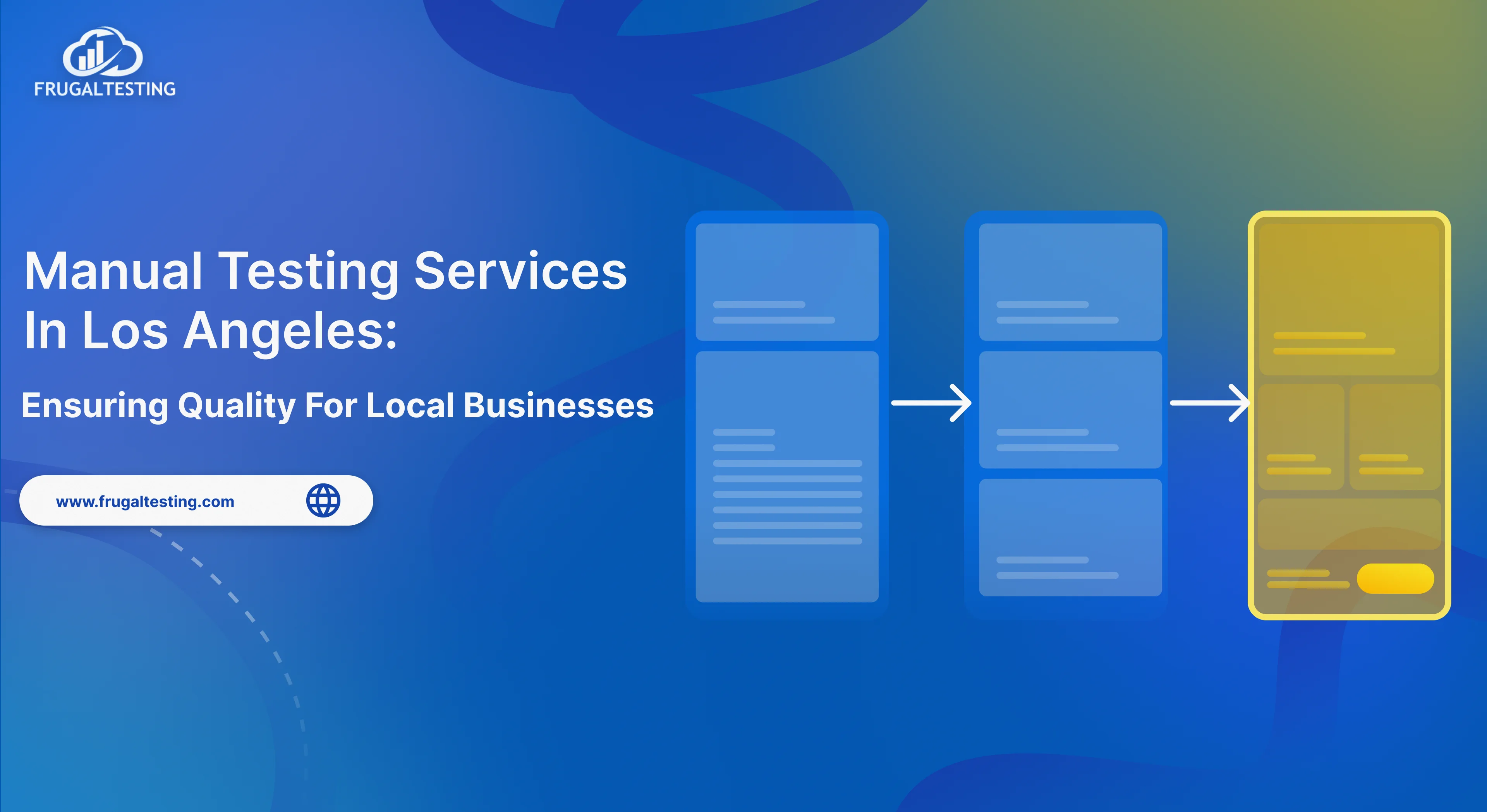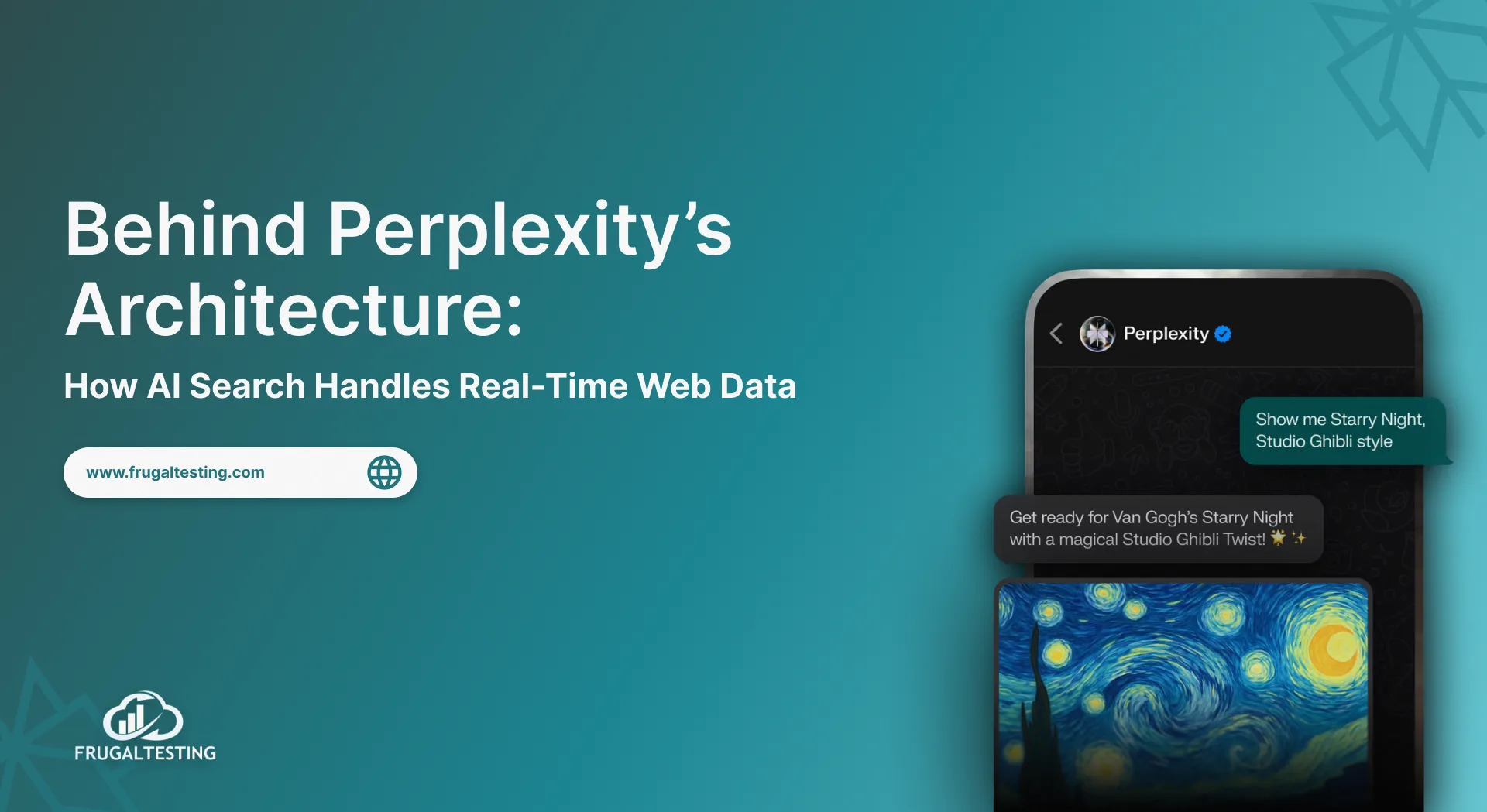The financial technology (Fintech) landscape is undergoing a seismic shift as artificial intelligence (AI) introduces unprecedented levels of automation, personalization, and efficiency. From AI-powered chatbots delivering 24/7 support to machine-learning algorithms that detect fraud in real time, AI-powered software testing and smart automation is redefining every touchpoint of the customer journey.
Predictive analytics harness vast data streams to offer proactive financial advice, while robotic process automation slashes turnaround times for loan approvals and account onboarding. In this deep-dive blog, we explore how these innovations not only drive growth and cut costs but also set new benchmarks for seamless, secure, and hyper-personalized banking experiences.
💡 What You Will Gain From This Blog?
📌 Understand the role of artificial intelligence in modern finance.
📌 Discover how AI in fintech and software testing fuel innovation, efficiency, and trust.
📌 Learn about top fintech companies, fintech software development services.
📌 Understand best practices for integrating software testing tools with AI-driven financial apps.
📌 Gain actionable insights on leveraging AI-powered solutions for risk management, fraud detection, and personalization.
What does the AI fintech market look like? Trends & insights
AI is redefining how Fintech companies and traditional banks compete for customer satisfaction and customer trust. In 2024, the global AI in fintech market was valued at USD 12.6 billion. By 2028, it’s projected to exceed USD 35.5 billion, registering a CAGR above 25%, driven by rising demands for real-time data, deeper insights, and robust risk management.
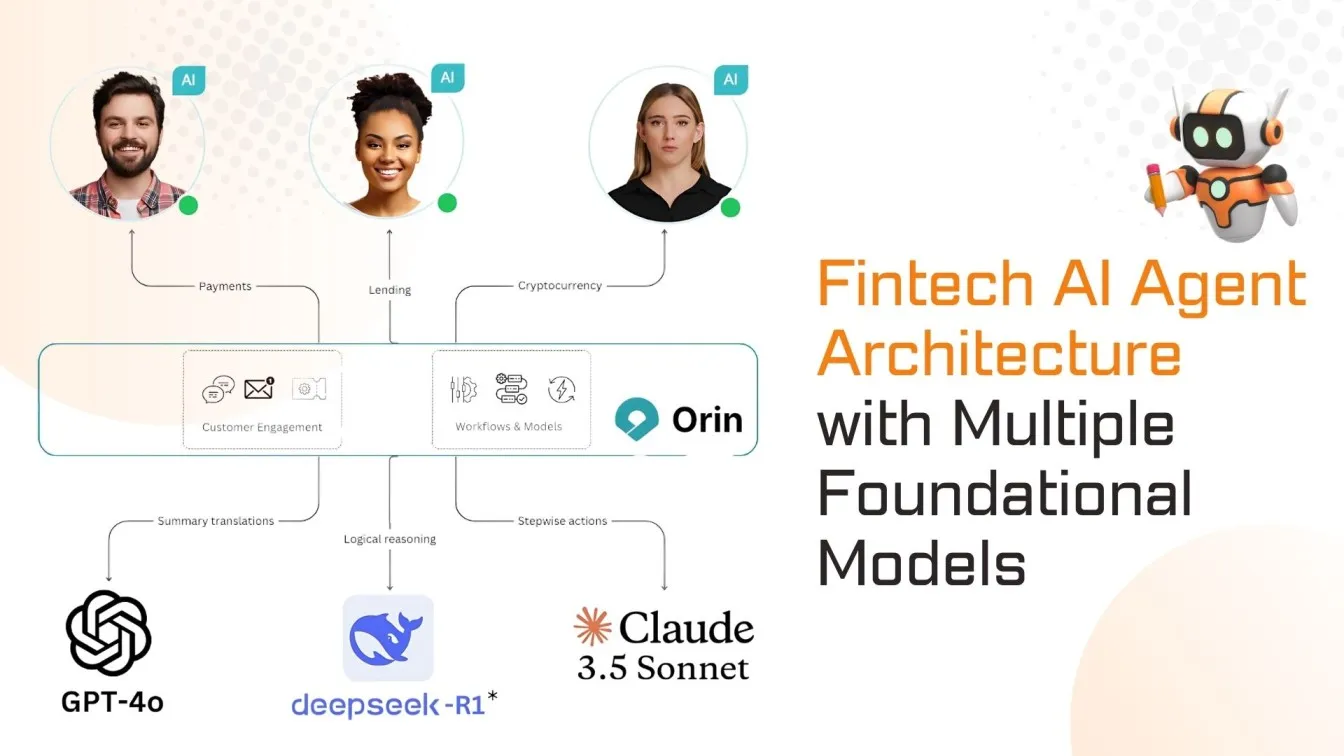
Key trends shaping this expansion include:
- Hyper-Personalization & Digital Tools: Leveraging transaction history, social media activity, and vast amounts of customer data, AI models craft highly tailored financial products loans, savings plans, and investment advice raising customer loyalty and retention.
- Unified Risk Management: AI-driven systems combine predictive analytics with anomaly detection to flag suspicious activities in real-time, streamlining financial operations and ensuring compliance.
- Intelligent Automation: From KYC and AML workflows to portfolio rebalancing, AI automates repetitive tasks and augments human agents for improved throughput and error reduction.
How is finance evolving with AI?
The financial sector is experiencing a paradigm shift as institutions integrate AI-powered chatbots, advanced analytics, and AI-driven automation into their customer service and back-office functions. This evolution can be summarized in three pillars:
- Data-Driven Decision Making
By ingesting transaction history, credit bureau data, and digital tools gathered insights, AI models uncover spending patterns and creditworthiness markers. This enables financial institutions to refine risk models, optimize pricing, and improve customer satisfaction by offering the right product at the right time. - Autonomous & Assisted Workflows
Repetitive tasks like form verification, KYC checks, and reconciliation are handled by RPA bots enhanced with machine learning, freeing up human agents to focus on complex tasks that require human intervention and emotional intelligence. - Real-Time Fraud & Compliance Monitoring
Streaming analytics platforms process real-time data from payment gateways, ATM networks, and trading systems to detect irregularities. Flagged suspicious activities trigger alerts, enabling swift human review and minimizing financial losses.
Example: AI-Powered Anomaly Detection for Transaction Streams
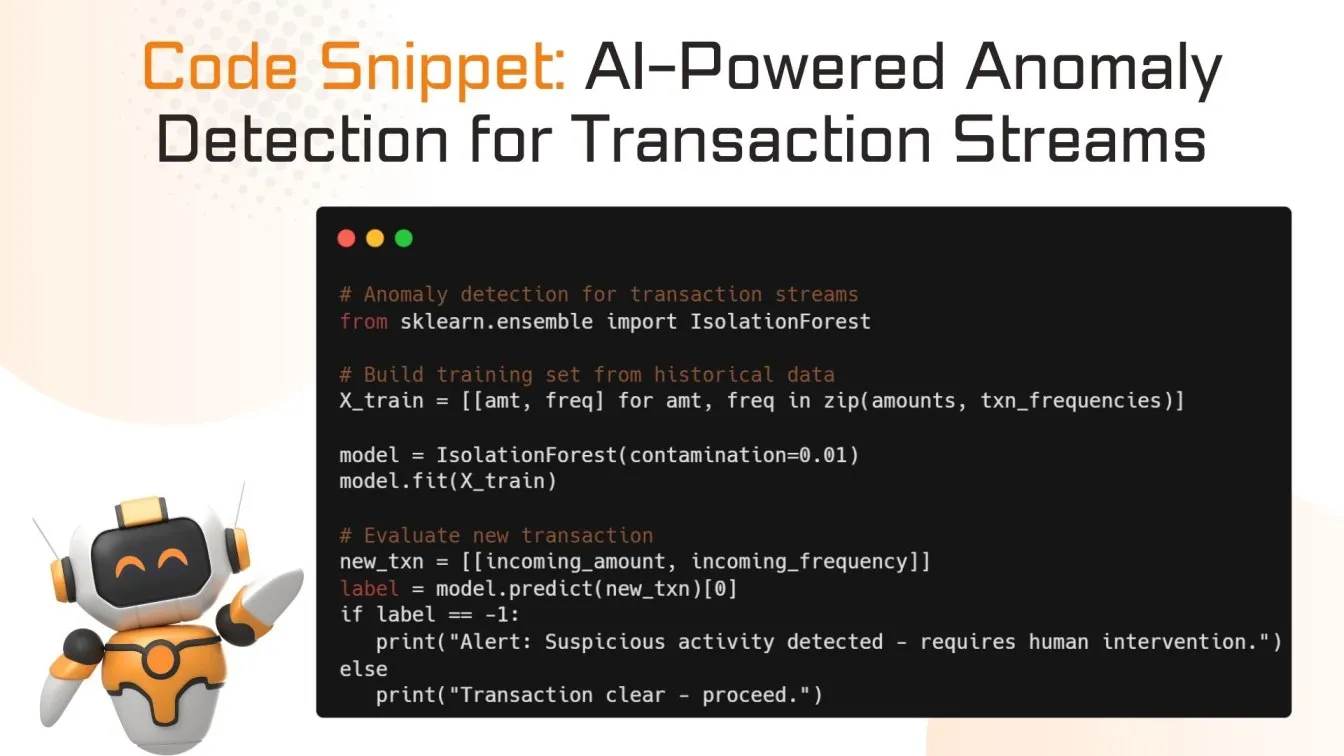
How is the AI revolution transforming banking & fintech?
AI is reshaping banking and fintech at every level from instant, emotion-aware chatbots and data-driven digital assistants to predictive maintenance for critical infrastructure and self-optimizing trading algorithms delivering faster, more reliable, and highly personalized financial services.
- AI-powered chatbots address up to 80% of routine inquiries, such as balance checks or transaction status, enhancing customer service while reducing load on human agents.
- UPI (Unified Payments Interface), a widely used payment method in India, integrates seamlessly with AI technology to enhance customer experiences. AI-powered chatbots can assist users with UPI-based transactions, enabling faster and more secure payment experiences.
- Digital Assistants equipped with emotional intelligence analyze customer sentiment and adapt responses, elevating customer satisfaction during high-stress scenarios.
- Predictive Maintenance for ATM and POS networks leverages IoT sensor data and machine learning to forecast hardware failures, ensuring uninterrupted service delivery.
- Algorithmic Trading & Portfolio Management: Advanced neural networks simulate market conditions, continuously refining investment strategies to optimize returns and mitigate risk.
Which key players are benefiting from AI in fintech?
Leading fintech innovators like Stripe, PayPal, Square, Ant Group, and JPMorgan are harnessing AI from fraud-fighting ML models and real-time risk scoring to AI-driven credit assessments and automated legal review to streamline operations, bolster security, and enhance customer trust.
- Stripe: Its Radar solution, powered by ML models, reduces fraud losses by over 60% and provides actionable insights into transaction patterns.
- PayPal: Implements AI-based risk scoring to process billions of transactions with low false-positive rates, boosting customer trust.
- Square: Underwrites merchant loans using AI-driven credit scoring that incorporates both financial history and social media activity.
- Ant Group (Alipay): Manages enormous transaction volumes with deep learning networks, safeguarding against fraudulent activities in real time.
- JPMorgan: Their COIN system automates legal contract review, cutting 360k hours of manual work and accelerating deal closures.
What are the top AI use cases in fintech & financial services?
AI is revolutionizing the fintech and financial services industries, offering innovative solutions to enhance customer experiences, optimize operations, and improve decision-making. Key use cases include fraud detection, personalized financial advice, algorithmic trading, and risk assessment, all driving efficiency and security. We will explore some of these in detail below:
How Generative AI is Revolutionizing Personalized Financial Advice
Generative AI is transforming financial services by delivering tailored, data-driven insights to users. Key applications include:
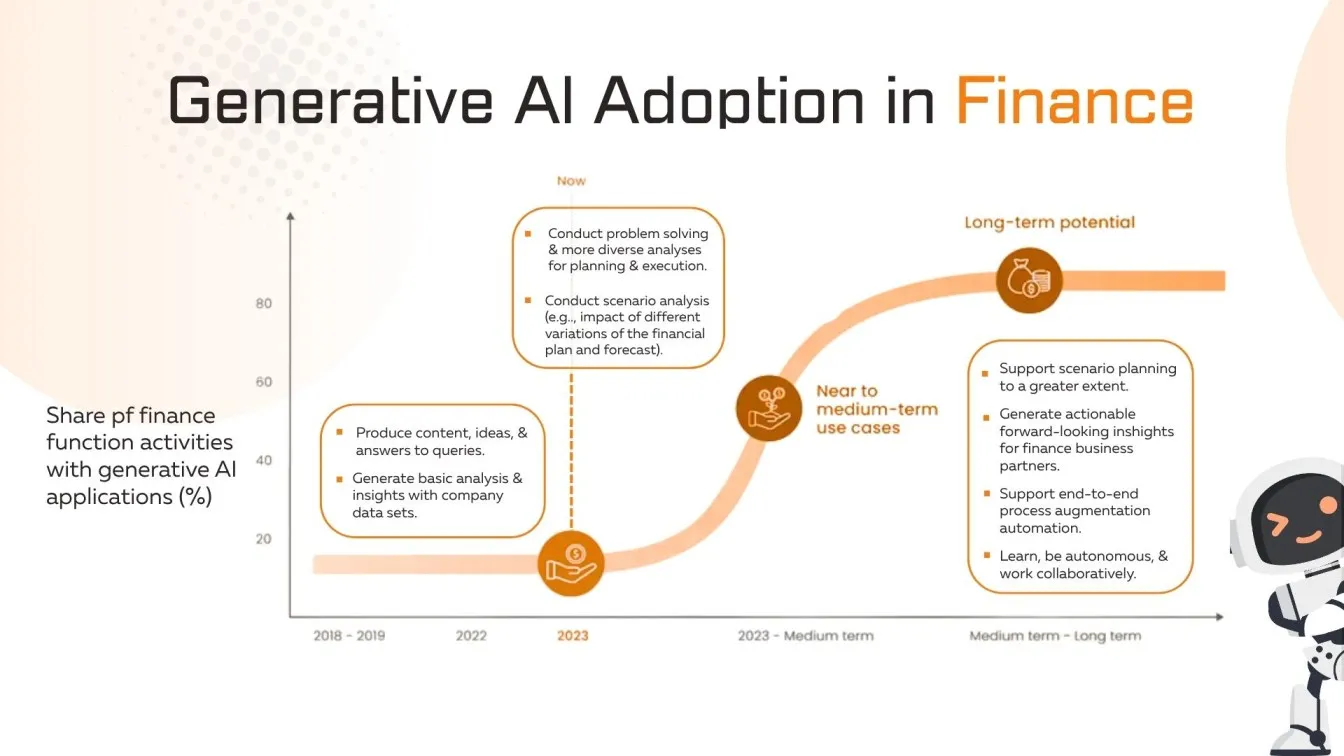
- Dynamic Investment Strategies: AI analyzes market data and user preferences to create evolving, personalized investment portfolios.
- Tailored Financial Planning: It provides customized advice for budgeting, savings, and retirement planning based on individual financial data.
- Real-Time Recommendations: AI offers on-the-fly suggestions, adjusting budgets and investments based on spending habits and financial changes.
- Predictive Personalized Alerts: AI predicts financial scenarios and alerts users to opportunities or risks, enabling proactive decision-making.
- Interactive Virtual Advisors: AI-powered assistants engage users with personalized advice, adapting to their financial literacy and needs.
Why use AI for credit risk assessment & management?
In the fintech sector, credit decisions have moved beyond traditional FICO scores to AI-powered solutions that utilize alternative data mobile usage, social media footnotes, and even bill payment patterns. This approach broadens credit access, especially for the underbanked, while improving default prediction accuracy by over 20%.
# Logistic regression with engineered features for credit scoring
from sklearn.linear_model import LogisticRegression
features = create_features(transaction_history, credit_utilization, social_sentiment)
labels = loan_outcomes
clf = LogisticRegression(max_iter=200)
clf.fit(features, labels)
print(f"Accuracy: {clf.score(features, labels):.2f}")Comments: Incorporating deeper insights like social sentiment can boost predictive power.
How does AI enhance software testing and bug detection for Fintech Apps?
AI is transforming software testing in fintech apps by automating test case generation, predicting defects, and enhancing visual regression, leading to faster, more efficient testing and higher-quality apps.
- Automated Test Case Generation: NLP-driven parsers translate functional specs into end-to-end test scripts, reducing regression cycles by 40%.
- Predictive Defect Analysis: Machine learning identifies modules prone to defects based on code complexity and change history, optimizing allocation of QA(Quality Assurance) resources.
- Visual Regression: Computer vision compares UI snapshots across versions, catching layout shifts that degrade user experience.
How does AI power fraud detection in fintech?
AI enhances fraud detection in fintech by leveraging advanced techniques like behavioral biometrics, graph neural networks, and adaptive rules engines to identify and prevent fraudulent activities, ensuring both security and seamless customer experiences.
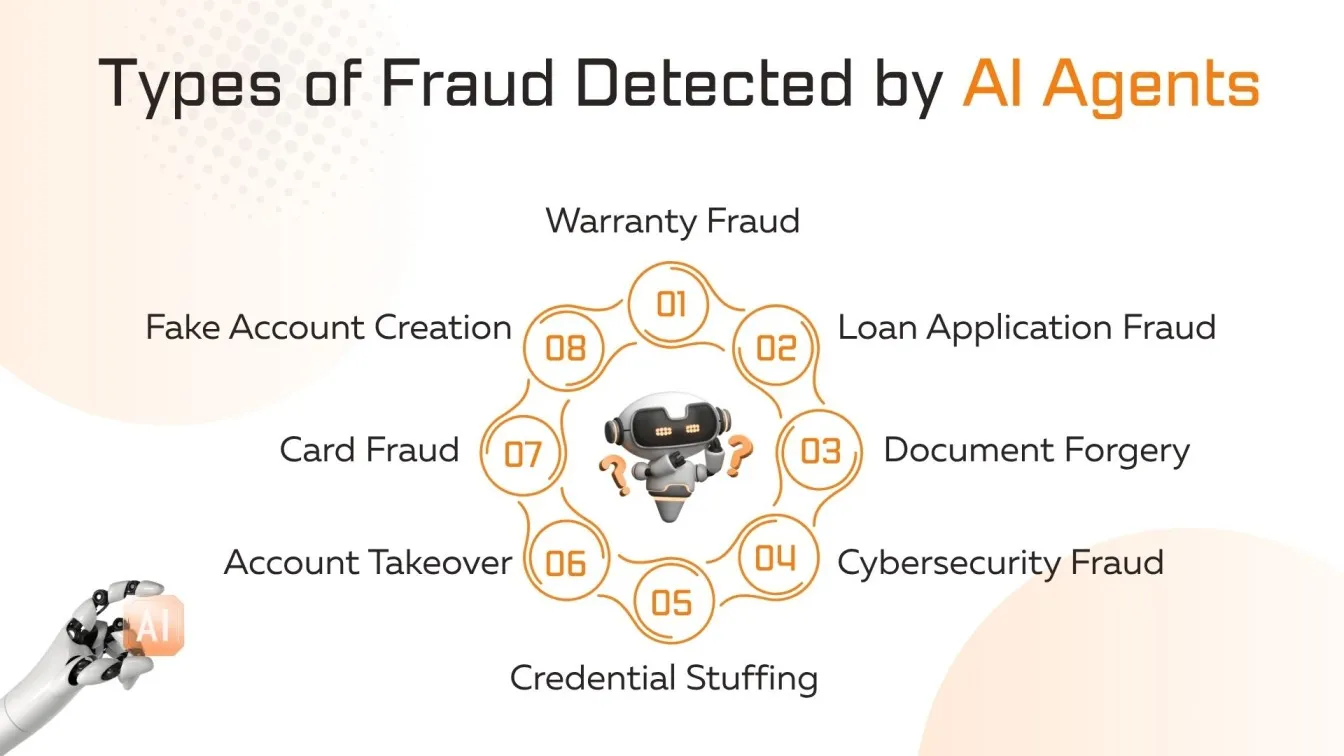
- Behavioral Biometrics: Models parse typing speed, mouse trajectories, and device accelerometer data to authenticate users implicitly, stopping account takeover.
- Graph Neural Networks: Map intricate relationships among accounts to expose coordinated fraud rings.
- Adaptive Rules Engine: Reinforcement learning modulates fraud score thresholds in response to changing attack patterns, balancing security with customer service.
What can AI virtual assistants do in financial services?
AI virtual assistants in financial services go beyond FAQs, offering personalized financial coaching, voice-activated payments, and multilingual support to enhance customer interactions and financial management.
- Personal Financial Coaching: They analyze spending patterns and recommend budgets, investments, and savings plans, acting as digital financial planners.
- Voice-Activated Payments: Secure voiceprint recognition authorizes bill pay and P2P transfers.
- Multilingual Support: Real-time translation and sentiment analysis ensure seamless customer interactions across geographies.
How is AI transforming algorithmic trading & portfolio management?
AI is revolutionizing algorithmic trading and portfolio management by integrating quantamental models, optimizing portfolios dynamically, and automating risk parity and hedging, enhancing trading strategies and minimizing risks.
- Quantamental Models: Combine fundamental analysis (earnings reports, macro indicators) with technical signals in ensemble frameworks to seize alpha.
- Dynamic Portfolio Optimization: Leverages deep learning to solve large-scale asset allocation with complex constraints - liquidity, ESG, and risk budgets.
- Risk Parity & Hedging: AI-driven automation dynamically recalibrates hedges in volatile markets, protecting portfolios without manual oversight.
What are the benefits of AI in fintech: efficiency, accuracy & growth?
AI drives fintech forward by slashing costs and errors, scaling seamlessly, unlocking deep data insights, and delivering hyper-personalized experiences that fuel growth and competitive edge.
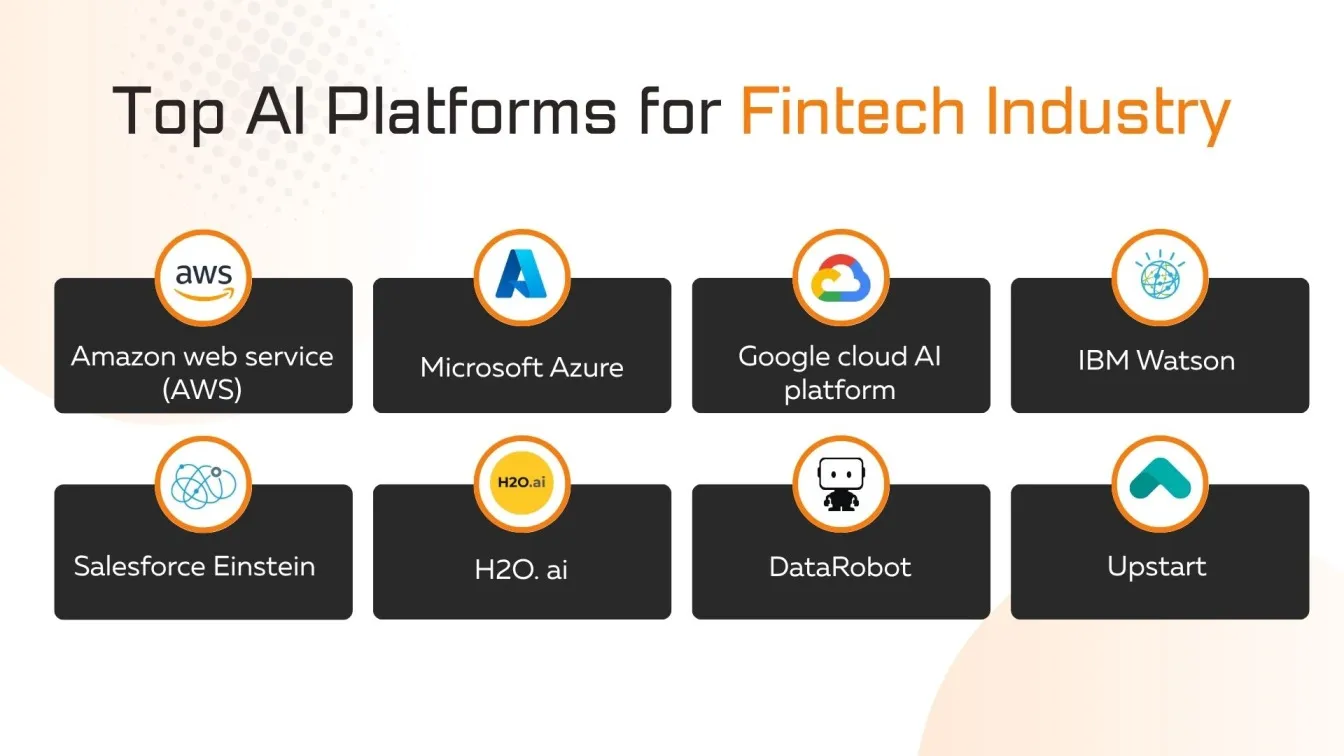
- Operational Efficiency: AI automates processes like KYC, AML checks, and account reconciliation, reducing manual work and operational costs. Tools like Onfido streamline customer verification, speeding up service delivery.
- Enhanced Accuracy: AI models improve credit scoring, fraud detection, and risk management by analyzing large datasets. Zest AI enhances creditworthiness predictions using alternative data, reducing defaults.
- Scalability: Cloud-based AI solutions like AWS SageMaker handle large data volumes and adapt to growth, ensuring smooth performance even during peak demand.
- Actionable Insights: AI analyzes transaction and user data to deliver insights for better decision-making. Kabbage uses AI to provide real-time, automated loan decisions for small businesses.
- Competitive Advantage: AI offers personalized services, from tailored recommendations to proactive alerts, fostering customer loyalty. Wealthfront and Betterment use AI-driven robo-advisors to provide customized investment portfolios.
What risks, compliance challenges & ethical considerations accompany AI in fintech?
AI’s promise in fintech comes with its own minefield of privacy, bias, transparency, and regulatory pitfalls - demanding airtight security, explainable models, and relentless compliance vigilance.
- Data Privacy & Security: Ensuring the security of sensitive financial data is critical. AI systems must use encryption, tokenization, and strict access controls to protect personal and transaction data.
For example, PayPal uses advanced encryption techniques to safeguard user information during payments and financial transactions. Hence payment gateway testing is utmost important for every business.
- Model Bias & Fairness: AI models need to be regularly audited to ensure they don’t inadvertently discriminate in areas like credit scoring or pricing. A case in point is Upstart, which uses AI for credit scoring but works to mitigate biases by including diverse data sources beyond traditional credit scores to provide fairer lending. Hence, data integration testing is crucial for any fintech business.
For Example: Upstart uses non-traditional data like education and job history to reduce bias in credit scoring, highlighting the need for rigorous data integration testing.
- Explainability & Transparency: AI models must be explainable to ensure transparency. Tools like SHAP and LIME help break down model decisions, ensuring that both regulators and end users can understand how outcomes like loan approvals are determined. This is crucial for FICO when applying AI to credit scoring.
For Example: FICO uses tools like SHAP to explain AI-based credit decisions, ensuring transparency for both regulators and consumers.
- Regulatory Evolution: AI must comply with constantly evolving regulations such as the EU AI Act and AML directives. These laws require fintech firms to update their AI models to ensure compliance.
For example, Stripe’s ongoing compliance with AML regulations to monitor transactions for fraud.
- Operational Risk: While AI improves efficiency, human oversight is vital to catch system failures.
For example, Ant Group, which relies on AI for fraud detection but also ensures that human agents verify flagged transactions to reduce false positives and ensure accuracy.
AI in fintech brings immense value, but to fully harness its potential, businesses must address these risks with robust privacy protections, fairness measures, transparency tools, and ongoing compliance vigilance.
Wrapping it up: Key takeaways on AI in fintech
AI is redefining finance by enhancing customer service, automating complex workflows, and strengthening risk management. By tapping into AI-driven analytics and digital tools, organizations turn transaction histories and external data into actionable insights for smarter decisions and standout experiences.
As we innovate, maintaining human oversight at critical junctures ensures ethical use, customer trust, and regulatory compliance which results in less tech failures. The next frontier is hybrid intelligence - marrying human domain expertise with AI’s speed and scale to deliver truly personalized financial services.
People Also Ask
What is ESG in fintech?
ESG stands for Environmental, Social, and Governance; it shapes sustainable investing and ethical lending, aligning financial products with broader societal goals.
How is machine learning used in fintech?
Machine learning underpins credit scoring, fraud detection, algorithmic trading, and personalized service, training on vast amounts of historical and real-time data.
What is the difference between DeFi and fintech?
DeFi (Decentralized Finance) leverages blockchain for peer-to-peer services without intermediaries, while fintech includes any tech-driven financial service, including regulated institutions.
What is the IBM AppScan standard?
IBM Security AppScan Standard is a web application security testing tool that helps organizations identify and remediate vulnerabilities in web applications before they are deployed and in production environments.
What is the difference between fintech and banks?
Fintech companies focus on agile digital tools and AI-powered solutions for niche services; banks are broad-service, regulated incumbents often built on legacy infrastructures.



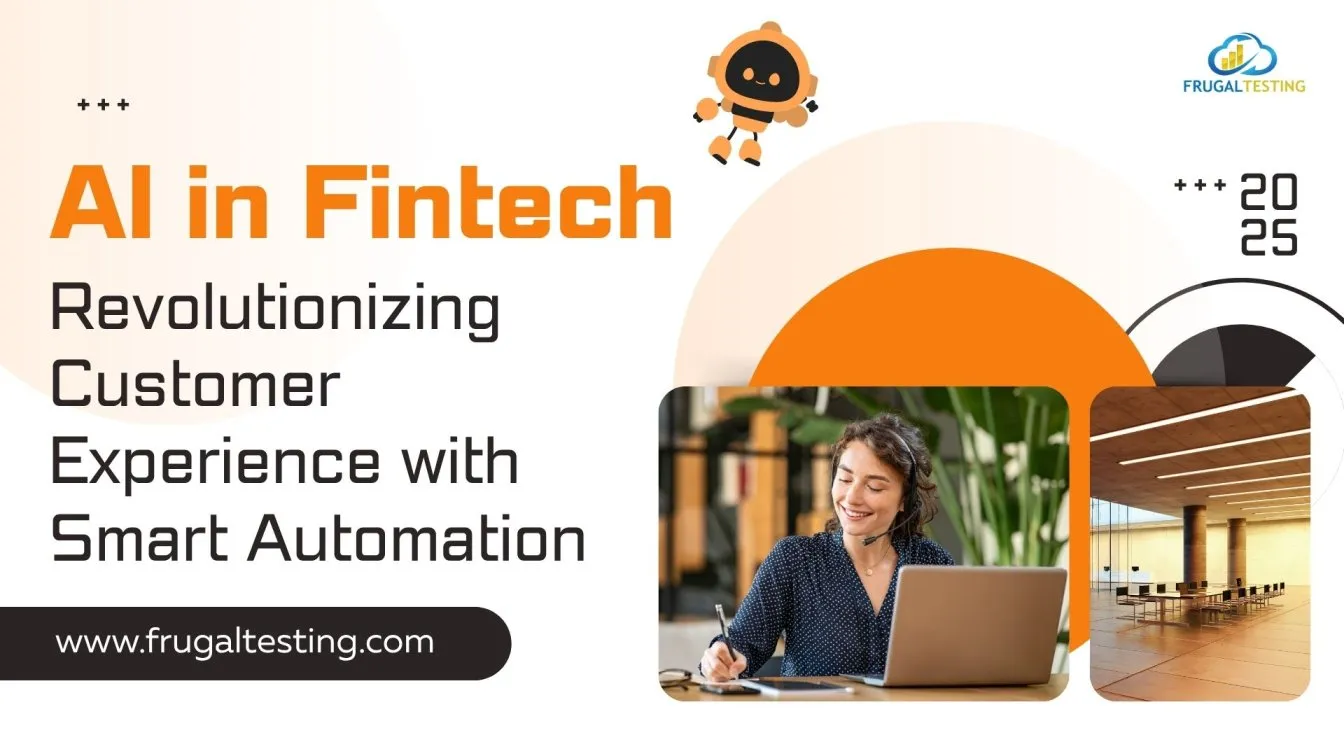

%201.webp)
